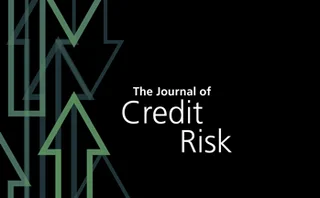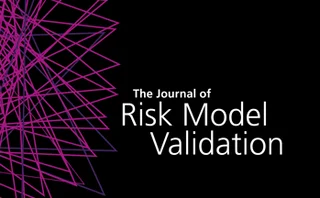Technical paper/Loss given default (LGD)
Machine learning prediction of loss given default in government-sponsored enterprise residential mortgages
The authors apply machine learning techniques to Loss Given Default estimation, identifying key variables in LGD prediction and evaluating the performance of various models.
Data-driven wrong-way risk
A calculation method for regulatory CVA wrong-way risk based on credit and exposure is introduced
Merton’s model with recovery risk
By adding a correlated risk driver to Merton's model for corporate bond pricing, the authors model the empirically observed recovery risk premium.
Mind the gap
A default intensity model reveals the risk carried by a highly leveraged counterparty
Incorporating small-sample defaults history in loss given default models
This paper proposes a methodology for estimating loss given default (LGD) that accounts for small default sample sizes.
A prudent loss given default estimation for mortgages. II
This paper introduces a prudent methodology to accurately estimates loss given default for mortgage portfolios and to stress test those portfolios effectively.
Beyond the contract: client behavior from origination to default as the new set of the loss given default risk drivers
In this paper, we expand the modeling process by constructing a set of client-behavior-based predictors that can be used to construct more precise models, and we investigate the economic justifications empirically to examine their potential usage.
Modeling loss given default regressions
The authors investigate the puzzle in the literature that various parametric loss given default (LGD) statistical models perform similarly, by comparing their performance in a simulation framework.
Finding the corporate credit cycle for IFRS 9
Decomposing corporate default rates helps identify credit cycles
Benchmarking loss given default discount rates
This paper provides a theoretical and empirical analysis of alternative discount rate concepts for computing loss given default rates using historical bank workout data.
Loss given default estimation: a two-stage model with classification tree-based boosting and support vector logistic regression
In this paper, the authors using a data set composed of five Japanese regional banks, propose an loss given default estimation model using a two-stage model, classification tree-based boosting and support vector regression (SVR).
Counterparty trading limits revisited: from PFE to PFL
The potential future loss is proposed as a replacement for PFE
A new model for bank loan loss given default by leveraging time to recovery
In this paper, the author estimates a two-equation system: one for LGD that incorporates time to recovery as one of the model explanatory variables, and the other for time to recovery using survival models that address data censoring.
Underperforming performance measures? A review of measures for loss given default models
This paper reviews the ways of measuring the performance of LGD models that have been previously used in the literature and also suggests some new measures.
A latent variable credit risk model comprising nonlinear dependencies in a sector framework with a stochastically dependent loss given default
This paper proposes a latent variable credit risk model for large loan portfolios. It employs the concept of nested Archimedean copulas to account for both a sector-type dependence structure and a copula-dependent stochastic loss given default (LGD).
Addressing probationary period within a competing risks survival model for retail mortgage loss given default
This paper presents a novel approach to modeling retail mortgage LGD estimation.
When banks venture beyond home turf: consequences for loan performance
In this paper, the authors analyze the credit risk of Japanese regional banks when they lend to areas outside their original operational bases.
Stochastic loss given default and exposure at default in a structural model of portfolio credit risk
The authors develop a factor-type latent variable model for portfolio credit risk that accounts for stochastically dependent probability of default (PD), loss given default (LGD) and exposure at default (EAD) at both the systematic and borrower specific…
A prudent loss given default estimation for mortgages
The author of this paper proposes a prudent methodology to correct for potential biases in LGD estimations due to historical price appreciations, appraisal biases and wear-and-tear or potential damage to the house.
Benchmarking the loss given default parameter for mortgage loan portfolios under stress
The authors analyze the impact of a decline in property prices that leads to stressed recovery rates for collateral on the loss given default (LGD) parameter in portfolios of mortgage loan.
Further investigation of parametric loss given default modeling
The authors conduct a comprehensive study of some parametric models that are designed to fit the unusual bounded and bimodal distribution of loss given default (LGD).







